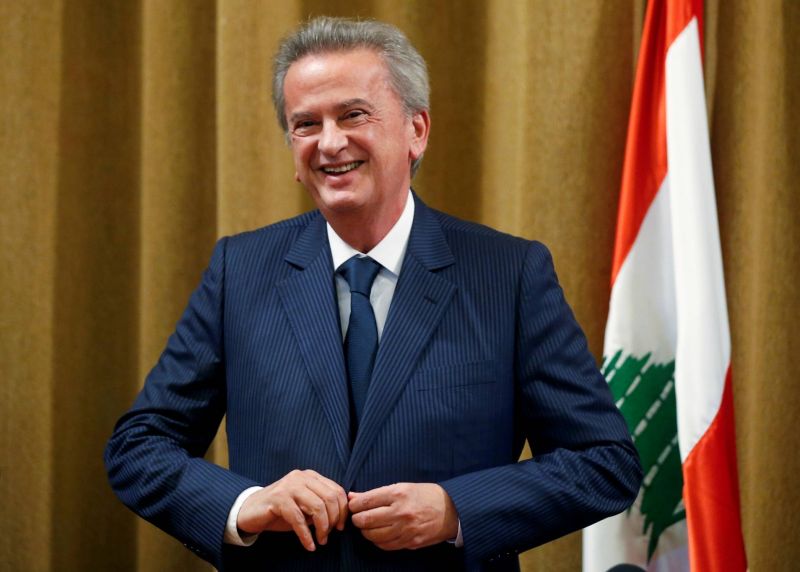
Riad Salameh reacts after a news conference at the central bank in Beirut in November 2019. (Credit: Mohamed Azakir/Reuters)
Want to get the Morning Brief by email? Click here to sign up.
Riad Salameh announced that he had had a “reputable firm” look into his investments and transactions and published the results, which he said showed no wrongdoing. Salameh said the audit revealed that no Banque du Liban or public funds were used in transactions with Forry Associates, a company owned by Salameh’s brother that had been at the center of one of at least three probes into the central bank governor’s dealings. The self-examination by an unnamed firm is unlikely to persuade authorities in Switzerland, France and Luxembourg to drop their investigations into alleged money laundering — nor is it likely to persuade those in Lebanon demanding a forensic audit of the central bank’s accounts to reassess their position.
MPs from the Strong Lebanon bloc, most of whom are tied to the Free Patriotic Movement, filed a complaint yesterday before the Constitutional Council, seeking to overturn Parliament’s amendments to the electoral law. On Oct. 19 Parliament voted to move the date of elections from May 8 to March 27 and to remove a special six-seat expatriates’ constituency in favor of having expatriates vote in their home districts. The new complaint makes a number of charges against Parliament’s move, including that it was not passed by an absolute majority if deceased and resigned parliamentarians are counted, which the MPs contend is mandatory. Speaker Nabih Berri ruled during voting that the majority be calculated based on the number of presently serving MPs — 11 having either died or resigned since the last election. The complaint also charges that the amendments deprive expatriates of their right to a constituency, infringe on the prerogatives of the executive branch to set the date of elections, jeopardize turnout due to unpredictable winter weather and deprive those who would turn 21 between March 27 and May 8 of their right to vote. In a recent interview, Lebanon’s top official overseeing elections, Interior Minister Bassam Mawlawi, said that the outcome of the appeal should be known by mid-December.
Two of Lebanon’s envoys recently expelled from diplomatic posts in the Gulf said measures taken by those governments against Lebanese citizens living in these countries are “serious” and will “worsen in the days to come.” The comments were made after a meeting yesterday with the head of the Maronite Church, Bechara al-Rai. The two diplomats and a third envoy similarly expelled from the Gulf also met with President Michel Aoun two days ago. Following that meeting, Aoun said “efforts were underway” to resolve the diplomatic crisis. In addition to Saudi Arabia’s ban on Lebanese imports and transshipments, Gulf retaliation against Lebanon has included Kuwait reportedly drawing up a list of 100 foreign residents, mostly Lebanese, who will not be allowed to renew their residency.
Prime Minister Najib Mikati yesterday once again called for cabinet sessions to resume, saying they are necessary to implement reforms and advance negotiations with the International Monetary Fund and World Bank. He said the cabinet must start “with the steps required to resolve the new dispute with the Gulf countries.” Lebanon’s cabinet has not met for over a month since it adjourned on Oct. 12, after failing to come to a unified stance on Judge Tarek Bitar’s handling of the Beirut port explosion investigation. Hezbollah and its allies have insisted that Lebanon’s cabinet will only resume meeting when Bitar is removed from his role.
Russia will send Lebanon satellite images of the Beirut port taken on Aug. 4, 2020, before and after the devastating explosion, the head of the country’s space agency told reporters. President Michel Aoun formally asked for the images in October. The sharing of images comes days before Russian Foreign Minister Sergei Lavrov plans to host Lebanese Foreign Minister Abdallah Bou Habib in Moscow. The two will meet next Monday and will discuss the mutual relationship between their countries.